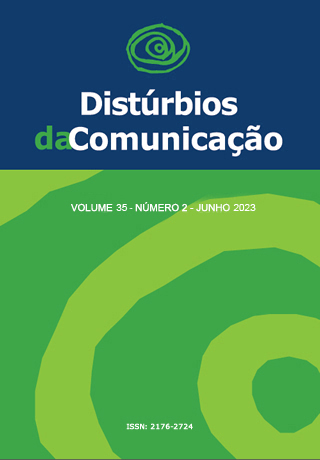The harmful effects of the latex “Glove Pacifier” in the Neonatal Unit
DOI:
https://doi.org/10.23925/2176-2724.2023v35i2e58329Keywords:
Patient Safety, Gloves, Protective, Pacifiers, Sucking Behavior, Intensive Care Units, Neonatal, Breast FeedingAbstract
In the Baby-Friendly Hospital-Neo Initiative, the use of pacifiers in the Neonatal Unit (UN) was proposed in a therapeutic way, and always under the supervision of a health professional. However, it should be noted that the device known as “Pacifier Glove” manufactured using a latex glove is being used as an alternative to cherish the newborn. Despite few studies, it is clear that this device should be contraindicated in the UN, since it can cause allergy to latex, transmit infections, cause serious accidents such as laryngotracheal aspiration of cotton due to the rupture of the latex glove, and depending on the size of the material, obstruct the airways, and lead to death. Furthermore, the device may interfere with craniofacial growth and development and cause harm associated with breastfeeding and maternal and child health. The substitution of the “Pacifier Glove” for other strategies, even for the conventional or orthodontic pacifier, to deal with the pain and stress situations of the baby should be avoided to avoid the risk of serious accidents.The teat use protocol, the baby’s pain management protocol, the adoption of the Kangaroo Method in the neonatal unit to promote the baby’s development and behavior, and the training/monitoring of the practices adopted by the Maternal and Child Team, regarding the care offered, are alternatives more complex, but which must be analyzed by those who wish to offer reliability to their institutional processes.
Downloads
References
Maroja MCS, Silva ATMC, Carvalho AT. Iniciativa Hospital Amigo da Criança: uma análise a partir das concepções de profissionais quanto às suas práticas. Rev Port Saúde Pública. 2014; 32(1): 3-9. http://dx.doi.org/10.1016/j.rpsp.2014.02.002
Lau C. Breastfeeding Challenges and the Preterm Mother-infant Dyad: A Conceptual Model. Breastfeed Med. 2018; 13(1): 8-17. https://doi.org/10.1089/bfm.2016.0206
Bellù R, Condò M. Breastfeeding promotion: evidence and problems. Pediatr Med Chir. 2017; 39(2): 156. https://doi.org/10.4081/pmc.2017.156
McNair C, Campbell-Yeo M, Johnston C, Taddio A. Nonpharmacologic Management of Pain During Common Needle Puncture Procedures in Infants Current Research Evidence and Practical Considerations: An Update. Clin Perinatol. 2019; 46(4): 709-30. https://doi.org/10.1016/j.clp.2019.08.006
Nyqvist KH, Maastrup R, Hansen MN, Haggkvist AP, Hannula L, Ezeonodo A, et al. The Baby-friendly Hospital Initiative for Neonatal Wards. Core document with recommended standards and criteria. Nordic and Quebec Working Group; 2015. [cited 2022 Mai 23]; Available from: http://epilegothilasmo.gr/wp-content/uploads/2017/04/Neo_BFHI_Core_document_2015_Edition.pdf
Lubbe W, Ham-Baloyi WT. When is the use of pacifiers justifiable in the baby-friendly hospital initiative context? a clinician’s guide. BMC Pregnancy and Childbirth. 2017; 17(1): 130. https://doi.org/10.1186/s12884-017-1306-8
Ling HTB, Sum FHKMH, Zhang L, Yeung CPW, Li KY, Wong HM, et al. The association between nutritive, non-nutritive sucking habits and primary dental occlusion. BMC Oral Health. 2018; 18(1): 145. https://doi.org/10.1186/s12903-018-0610-7
Batista CL, Ribeiro VS, Nascimento MD, Rodrigues VP. Association between pacifier use and bottle-feeding and unfavorable behaviors during breastfeeding. J Pediatr. 2018; 94: 596-601. https://doi.org/10.1016/j.jped.2017.10.005
Sampaio RCT; Brito MBG; Siebra LGB; Gonçalves GKM; Feitosa DMA; Cabral KSSA; Pinto DM. Association between pacific use and breastfeeding interruption: A literature review. Brazilian Journal of health Review. 2020; 3(4): 7353-72. DOI:10.34119/bjhrv3n4-011
Rocha AD, Costa AM. Uso de luvas de látex em substituição às chupetas em Hospitais Amigos da Criança. Rev Ped SOPERJ. 2021; 21(3)98-106. DOI: http://dx.doi.org/10.31365/issn.2595-1769.v21i3p98-106
Dadalto ECV. Interação mãe-bebê e uso de chupeta no contexto do nascimento pré-termo: Cultura, representações sociais e processos proximais. [Tese]. Vitória (ES): Programa de Pós-graduação em Psicologia, Universidade Federal do Espírito Santo; 2014.
Associação Brasileira de Normas Técnicas. Norma Brasileira 10334 – segurança de chupetas. Rio de Janeiro: ABNT: 2003. 20p.
Agência Nacional de Vigilância Sanitária (ANVISA). Resolução nº 221. 05 de agosto de 2002. Publicada no D.O.U. de 06 de agosto de 2002.
Palosuo T, Antoniadou I, Gottrup F, Phillips P. Latex medical gloves: time for a reappraisal. Int Arch Allergy Imm 2011; 156(3): 234-46. doi: 10.1159/000323892
Álvarez D, Rojas H. Alergia al látex, puesta al día. Rev Chil Dermatología. 2016; 32(4): 192-96. DOI: http://dx.doi.org/10.31879/rcderm.v32i4.79
Kelly KJ, Sussman G. Latex allergy: where are we now and how did we get there? Internet J Allergy Clin Immunol Pract. 2017; 5(5): 1212–1216. DOI: 10.1016/j.jaip.2017.05.029
Ferreira AM, Andrade D. Avaliação Microbiológica de luvas de procedimento: considerações para seu uso na técnica de curativo. Rev. Enferm. UERJ. 2010; 18(2): 191-7.
Pereira CNP; Silva BVN; Menezes PHB; Pedro JPS; Silva NRD; Chagas HDS. Damage and benefits to the child’s health due to the use of pacifiers: what pediatricians need to know. Braz. J. of Develop. 2020; 6(12): 101520-31. DOI:10.34117/bjdv6n12-591
Marques AL; Alves MB; Firmo WDCA; Sabbadini OS. Avaliação da Integridade de Luvas de Procedimentos Novas Utilizando Micro-organismos. Ensaios e Ciência. 2021; 25(5): 809-14. DOI: https://doi.org/10.17921/1415-6938.2021v25n5-espp809-814
Thomas S, Agarwal M, Mehta G. Intraoperative glove perforation--single versus double gloving in protection against skin contamination. Postgrad Med J. 2001; 77(909): 458-60. doi: OI: 10.1136/pmj.77.909.458 .
Trindade JPDA; Serra JRD; Tipple AFV. Index of perforation of procedure/surgical gloves used by workers in the purging of a material and sterilization center. Texto & Contexto - Enfermagem. 2016,25(2), e1410015. Disponível em: <https://doi.org/10.1590/0104-07072016001410015>. Epub 7 Jul 2016. ISSN 1980-265X. https://doi.org/10.1590/0104-07072016001410015.
Oberg C; Schwartz JP; Zander GF; Ruan JD; Santos EB. Passagem de microrganismos através de luvas de procedimento e de luvas cirúrgicas antes de sua utilização. Rev. Odontol. UNESP. 2017; 36(2): 127-30.
Machado MB. Contribuições para a tecnovigilância das luvas de látex e a biossegurança. [Dissertação]. Ribeirão Preto (SP): Escola de Enfermagem de Ribeirão Preto, Universidade de São Paulo; 2019.
Pineda R; Luong A; Ryckman J; Smith J. Exploratory study found that pacifier use did not affect feeding performance in full-term newborn infants, but it was related to lower socioeconomic status. Acta paediatrica, Oslo. 2018; 107(5): 806-10. DOi: 10.1111/apa.14253.
Downloads
Published
Issue
Section
License
Copyright (c) 2023 Janaína de Alencar Nunes, Mônica Barros Pontes, Sandra Willéia Martins, Nállia Quirina Trindade de Coimbra, Hilmara Aparecida Jesus Maioli, Glaucia Cristina dos Santos França Sant’Ana, Amábile de Sousa Cavalcante,

This work is licensed under a Creative Commons Attribution 4.0 International License.









